Key takeaways:
- Medication management is crucial for individuals, especially those facing homelessness, and requires tailored support to overcome barriers to adherence.
- Complexity of medication regimens and accessibility to pharmacies are significant challenges that can hinder treatment adherence.
- Strategies such as personalized medication schedules, open communication with healthcare providers, and leveraging community resources can significantly improve medication management.
- Community support, including peer-led groups and innovative tools like tracking apps, can empower individuals in managing their medications effectively.
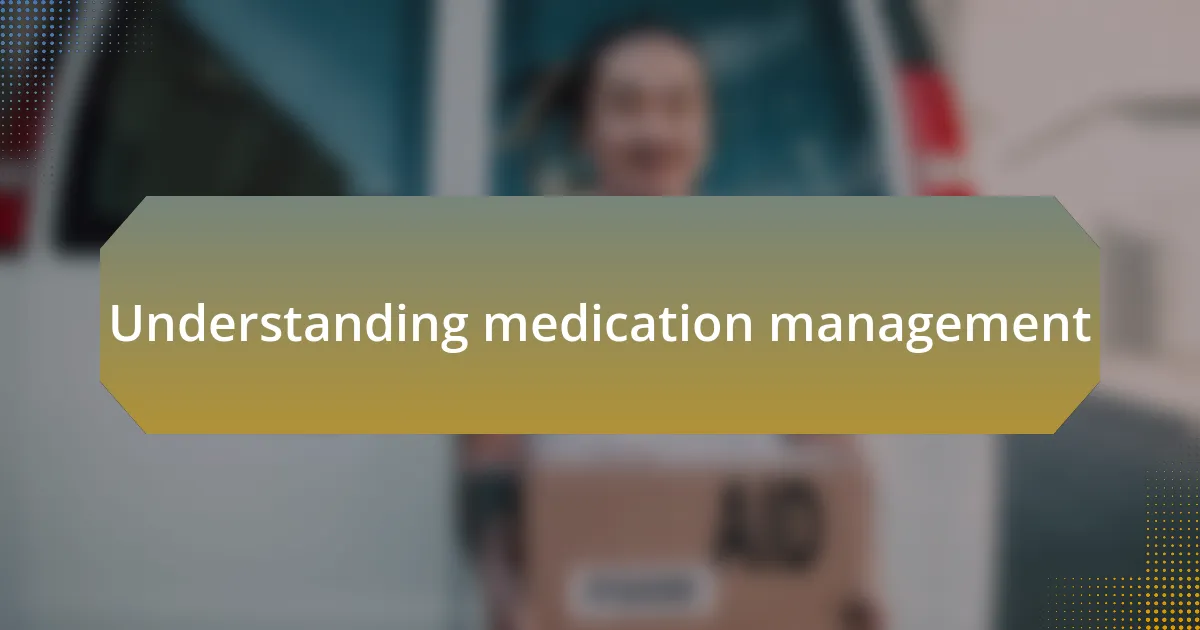
Understanding medication management
Medication management is a critical aspect of healthcare that involves overseeing the use of medications to ensure they are safe and effective. From my experience working in various community support programs, I’ve seen how overwhelming it can be for individuals, especially those facing homelessness, to keep track of prescriptions. Have you ever felt lost trying to remember the instructions for multiple medications? It’s no surprise that many in vulnerable situations struggle to adhere to their treatment plans.
When I think about medication management, I often reflect on the importance of tailored support. For someone without a stable home, the chaos of daily life can easily overshadow the need for consistent medication. I remember a client who often missed his doses due to poor access to pharmacies. With some simple organization strategies, we found ways to help him manage his medications more effectively. This taught me that individual approaches can make a significant difference.
Moreover, it’s essential to recognize the emotional toll that medication management can take on individuals. The fear of side effects or the stigma associated with certain medications can create barriers to treatment. I once spoke with someone who was anxious about taking antidepressants due to what others might think. Such feelings illustrate that understanding and empathy are just as important as the logistics of medication management. How do we create an environment where everyone feels safe to seek the help they need?
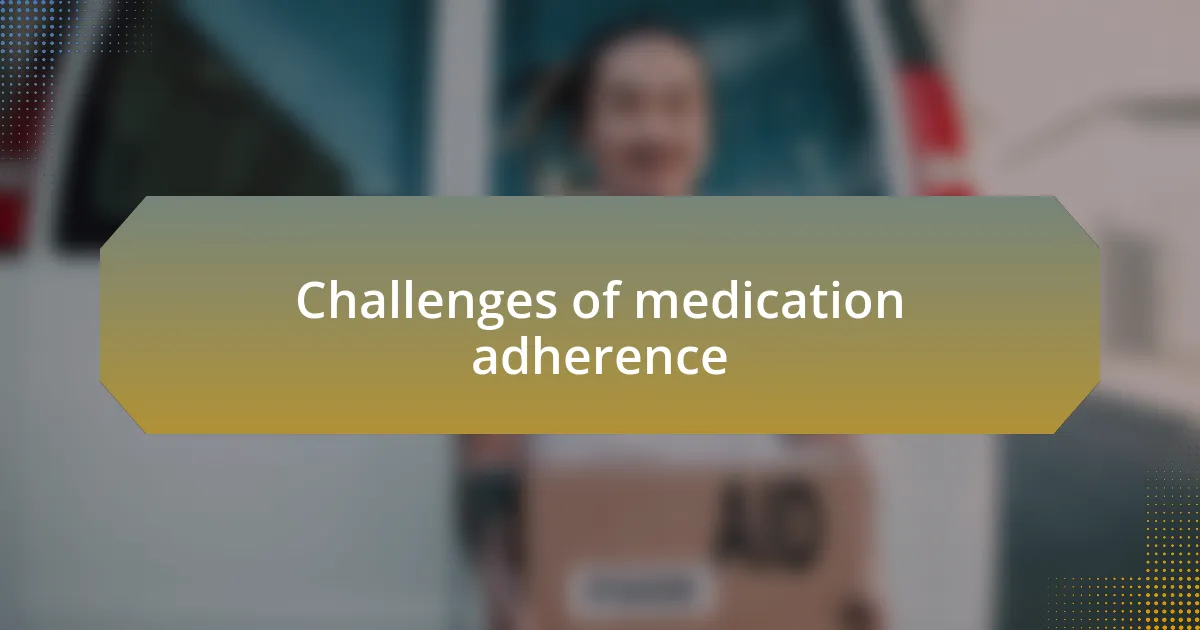
Challenges of medication adherence
One significant challenge of medication adherence is the sheer complexity of treatment regimens. Imagine sorting through bottles of pills with varying instructions—morning, noon, and night. I once met a woman who had to manage twelve different medications daily. The confusion was palpable, and I could see how easy it was for her to miss doses, which in turn affected her health. How can we expect individuals in such situations to keep track?
Another barrier involves the accessibility of necessary resources. For many living without stable housing, getting to a pharmacy can be a daunting task. I recall working with a young man who had been discharged from the hospital but struggled to refill his prescriptions because there was no pharmacy close enough. The stress of ensuring he had his medications compounded his mental health challenges, demonstrating how logistical hurdles can lead to missed treatments.
Lastly, the stigma surrounding certain medications can powerfully deter individuals from adhering to their regimens. I once supported an elderly gentleman who needed to take pain management medication but hesitated because of what others might say. His fear of judgment not only hindered his recovery but also illustrated a vital point: the emotional landscape of medication management is often just as crucial as the medications themselves. How do we address these fears while fostering a sense of community and understanding?
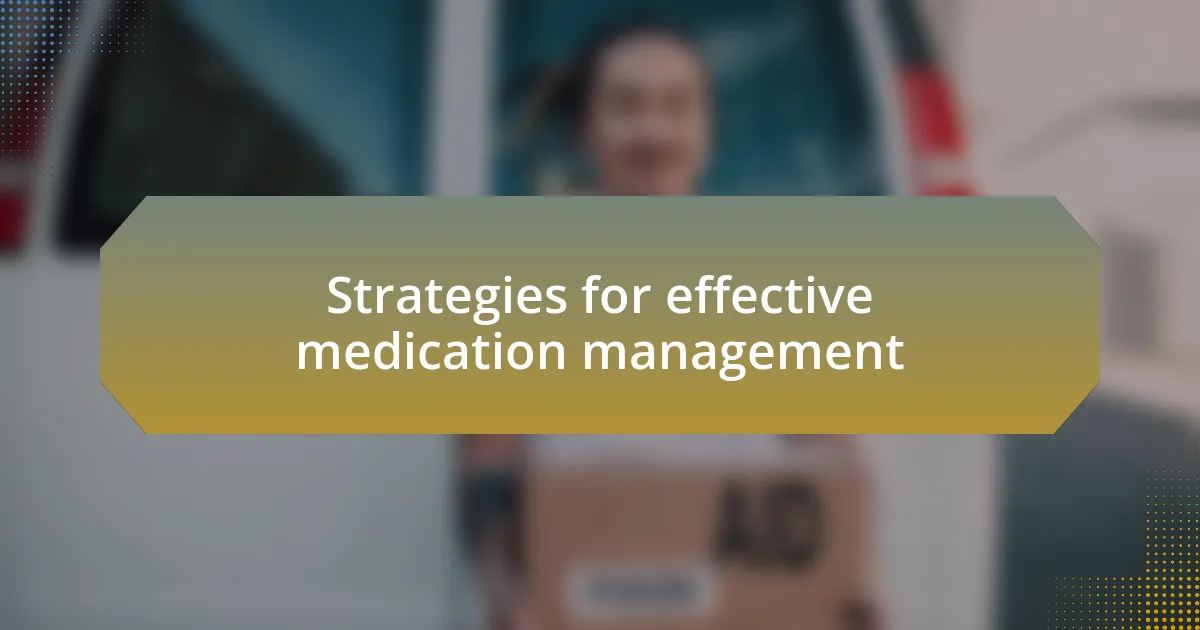
Strategies for effective medication management
One effective strategy for medication management is creating a personalized medication schedule, which I have seen work wonders. I remember a case where a client struggled to keep track of multiple prescriptions. We collaborated to develop a color-coded chart that clearly outlined each medication, its purpose, and the times it needed to be taken. This small adjustment transformed the way they managed their health, reducing missed doses significantly and instilling a sense of control and empowerment. Isn’t it amazing how a simple organizational tool can make such a profound difference?
Additionally, fostering open communication between healthcare providers and patients is crucial. I recall working with a woman who felt overwhelmed during medical appointments and rarely voiced her concerns about side effects. By encouraging her to ask questions and express her feelings about her medications, we uncovered alternatives that made her feel more comfortable. This active dialogue did not just improve her understanding but also made her feel more valued as a participant in her care. How often do we consider the importance of our voices in our health journeys?
Lastly, leveraging community resources can significantly enhance medication adherence. I once facilitated a workshop that connected individuals with local organizations offering medication delivery services. It was remarkable to see how many participants were unaware of these resources. By bridging the gap between healthcare and community support, we can alleviate some of the logistical burdens that lead to missed medications. Isn’t it encouraging to know that simple connections can pave the way for better health outcomes?
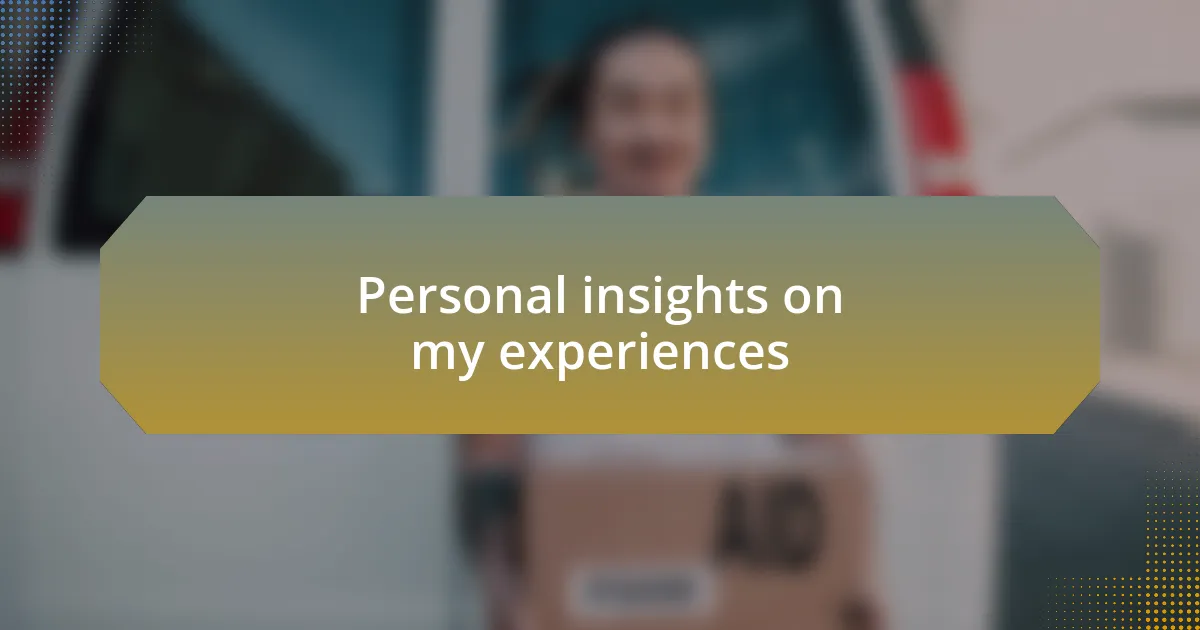
Personal insights on my experiences
One of the most eye-opening experiences I’ve had with medication management involved an individual who had lost everything, including their connection to healthcare. I remember sitting down with them in a shelter, and as they shared their story, it became clear how alienated they felt from the very system meant to support them. Listening to their frustrations reminded me just how critical a sense of belonging is when navigating health issues—how can anyone take control of their medication if they don’t feel they have a voice in the conversation?
I also had a moment that truly resonated with me when I worked alongside a young man who juggled several mental health medications. He often felt like a burden to his providers and hesitated to ask for adjustments, fearing they would question his commitment to recovery. Through our discussions, we explored the idea that medication management isn’t just a clinical process, but an ongoing, collaborative journey. How empowering it is to realize that seeking help can be a strength, not a weakness!
Finally, there was a time I organized a small gathering to discuss the challenges of medication access. It was during this event that I met a mother who had been unable to pick up her daughter’s prescriptions due to transportation issues. Her story stuck with me because it highlighted how important practical solutions are for overcoming barriers to health. Reflecting on such moments, I can’t help but wonder: what more can we do to dismantle these obstacles and ensure everyone has access to their vital medications?
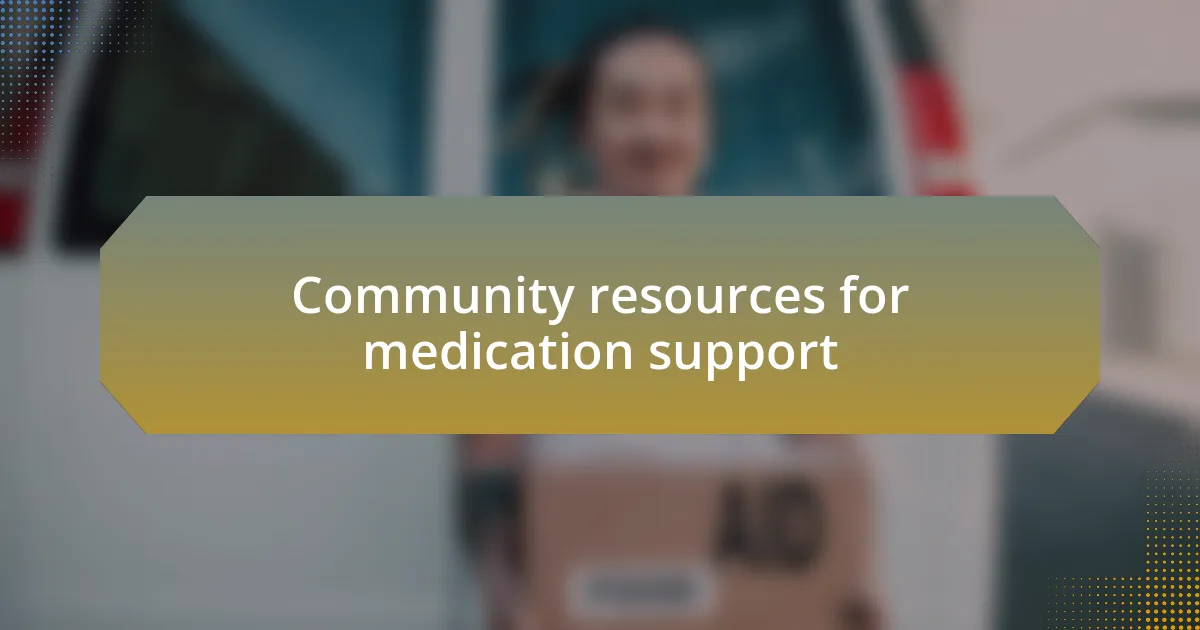
Community resources for medication support
Accessing community resources for medication support can make a world of difference for those experiencing homelessness. I remember visiting a local clinic that not only offered free prescriptions but also provided a welcoming environment where individuals felt safe discussing their needs. It struck me how such support can shift the narrative from mere survival to genuine care.
During my time volunteering at a community center, I witnessed how peer-led support groups helped people regain trust in managing their medications. These gatherings allowed members to share experiences and solutions, fostering a sense of camaraderie as they navigated health challenges together. Isn’t it powerful to think about how shared experiences can lead to collective healing?
There’s also a nonprofit in our area that has created a medication tracking app specifically for those in need. When I spoke to one of the developers, they expressed how vital it was to make healthcare tools accessible and user-friendly. This innovation resonated with me, as I reflected on the countless stories of individuals who struggle to remember multiple dosages amidst their daily challenges. How incredible would it be if technology could bridge gaps in health management for everyone?